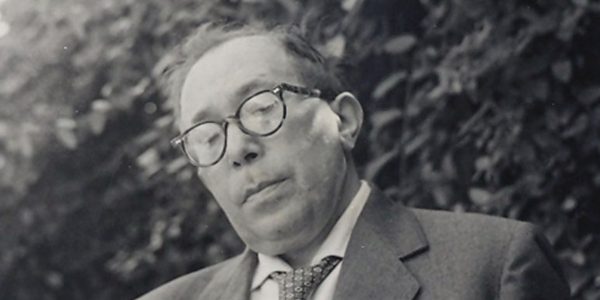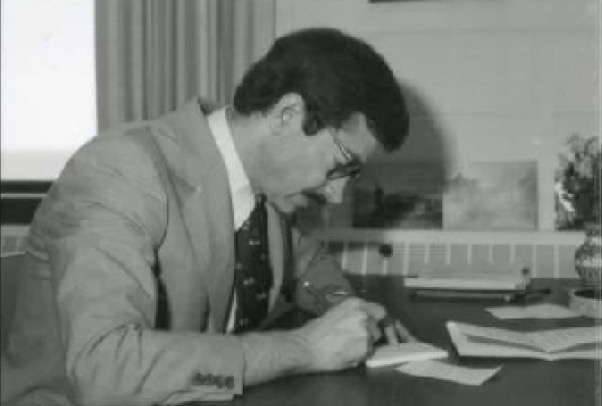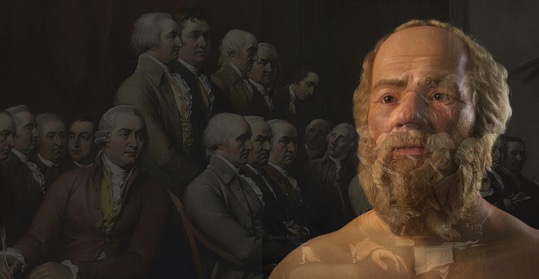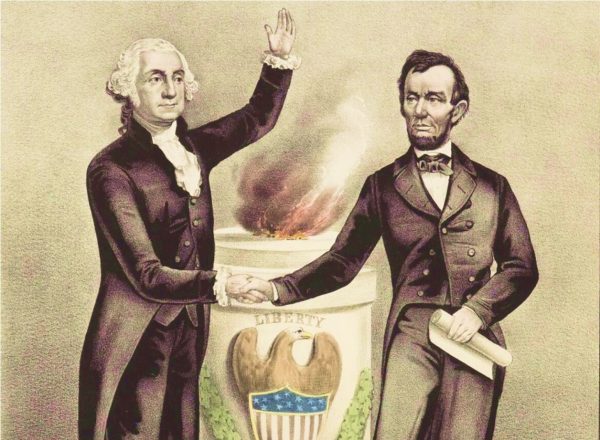Political Philosophy and Honor

The Leo Strauss Dissertation Award.
This September, the American Political Science Association gave its annual Leo Strauss Award for best doctoral dissertation in political philosophy to Elena Gambino for her “‘Presence in Our Own Land:’ Second Wave Feminism and the Lesbian Body Politic.” When the award was founded, Strauss’s student and Distinguished Fellow of the Claremont Institute Harry V. Jaffa wrote that “the prize will…discourage, rather than encourage the emulation of Leo Strauss.” Jaffa is quite roundly vindicated by this latest development, and so we reprint here his essay, originally published in Modern Age, Vol. 21, No. 4, Fall 1977 and reprinted as the appendix to How to Think About the American Revolution (Durham: Carolina Academic Press, 1978) and again in Crisis of the Strauss Divided: Essays on Leo Strauss and Straussianism, East and West (Lanham: Rowman & Littlefield, 2012).–Eds.
In what way shall we bury you? However you wish, if you can catch me, and I do not escape from you. Then he laughed gently, and turned and looked at us, and said: I do not, men, persuade Crito, that I am that Socrates who has been discussing and conducting argument; but he thinks I am that other one, whom he will see a little later as a dead body, and asks, how will he bury me.
– Plato, Phaedo 115c
Nothing perhaps better illustrates the enduring character of political philosophy than the enduring presence of its body servants, whose piety would inter the soul of the teaching with the body of the teacher.
At its annual meeting in 1974 the American Political Science Foundation established the Leo Strauss Annual Dissertation Award in political philosophy. This action followed a petition addressed to the Council of the Association, signed by some 44 distinguished teachers and scholars. Of these, it appeared, more than half were former students of Leo Strauss. The petition declared, among other things, that:
There is at present no such award in the field of political philosophy. We believe the establishment of one to be particularly important and timely. It is important that the association signalize to the profession in general, and to graduate students in the field, its recognition of political philosophy as one of the important traditions within the discipline.
In 1959 Leo Strauss published a book with the title essay, “What is Political Philosophy?” In that essay, Strauss wrote that: “Today, political philosophy is in a state of decay and perhaps putrefaction, if it has not vanished altogether. Not only is there complete disagreement regarding its subject matter, its methods, and its function; its very possibility in any form has become questionable.”
Familiar as I am with this and many similar passages in Strauss’s writings, I was compelled to wonder at this “important and timely…recognition of political philosophy.” Had the corpse suddenly sprung to life since 1959? Or had Strauss been utterly wrong then (and indeed to the last moment of his life) concerning the state of political philosophy? Certainly the latter seemed more likely than the former. But if so, so much the more inappropriate for such an award to honor a man who was so mistaken. In any event, the logical disjunction seemed to me to be complete, between Strauss’s assertion of “complete disagreement” concerning what political philosophy was, and an award by those in complete disagreement, in honor of Leo Strauss.
On February 4, 1975, I addressed the following letter to the editor of the American Political Science Review. Needless to say, I was refused publication both in the Review, and its sister journal PS:
When I arrived in Chicago for the meeting of A.P.S.A. las August, I learned—after the fact—of the establishment of a Leo Strauss Annual Dissertation Award. At the time, I was too surprised to react in any other way than astonishment. Since then I have given it much thought, and the more I have thought of it, the less I have liked it.
In my own eulogy of Strauss, I observed with no little diffidence that to honor a man implies confidence in the one honoring, no less than excellence in him who is honored. To doubt the former necessarily involves doubting the latter as well. While there is no escape from this dilemma, one may nevertheless approach it with a certain prudence. This I fear the promoters of the award have not done….
Leo Strauss was at odds with the mainstream—or perhaps one should say the various mainstreams—of the political sciences profession throughout his career. His best-known statement about the majority of his colleagues concluded by declaring that, like Nero, they were fiddling while Rome burned. They were saved from the reproach of being Neronian, he said, only by the fact that they did now know they were fiddling, and that they did not know that Rome was burning.
Strauss’s contempt was warmly reciprocated within the profession. This was shown by the attack, not only on Strauss, but on his school, by Schaar and Wolin, in the pages of the American Political Science Review in an extended review (followed by rebuttals and replies) of Essays on the Scientific Study of Politics. This volume, by Strauss’s former students, concluded with his famous epilogue. On the whole, Strauss enjoyed this adversarial relationship. Solet Aristotles quaerere pugnam was the epigraph for his Walgreen Lectures in 1949. And Aristotle himself did not join the battle more assiduously than did Leo Strauss. How then is an Association consisting overwhelmingly of those whom Strauss attacked, and who attacked him, during his life, to agree on the standards of excellence to be honored in his name?
The motion in favor of the Strauss award speaks of “the universal recognition of Strauss’s exemplary devotion to the philosophic study of politics.” In truth, however, there has been no such recognition of Strauss, nor did he ever wish for it. If there can be no universal recognition of the philosophic study of politics, how can there be universal recognition of Strauss’s devotion to it? If Strauss ever taught anything, it is the impossibility, not to mention the undesirability, of such universal opinions. Indeed he was particularly averse to any alleged universal opinion in favor of a philosophic study of politics. Could there be such an opinion, he thought, it might lead to the establishment of the universal tyranny of the universal homogenous state. That was his contention in his debate with Kojève in On Tyranny.
The proposal to honor Strauss with an annual dissertation award bears a resemblance to a similar proposal made by the first political scientist, Hippodamus, as reported in the second book of the Politics. How will the field of “political philosophy” be defined for the purpose of the award? The profession generally speaks of “political theory.” And political theory is usually divided into “normative” and “empirical.” But this latter distinction is founded on that between “facts” and “values,” a distinction that Strauss attacked again and again. I cannot imagine anyone familiar with Strauss’s work who would impute validity to the distinction between normative and empirical theory. Yet most dissertations in “theory” will probably be based upon it. Will they be eligible for the award or not?
The distinction between the “normative” and the “empirical” is paralleled by certain others, e.g., that between theory and practice. Is the field of “political philosophy” to consist in the study of the books of those called political philosophers, or is it equally the philosophic study of political things, e.g., the words and deeds of politicians, legislators, judges, and generals, and including the study of constitutions, wars, elections, and trials? Although Strauss’s own work consisted mainly in the reading and interpreting of philosophic books, the books he read—and praised—frequently encouraged a much more inclusive conception of the field of political philosophy. This was certainly true of Aristotle’s Politics. But if the scope of the award is to be so broad how will the selection process deal with it?
But this brings us to the central problem, that of the judges themselves. Are they to be called “Straussians”? If they are, I can assure my professional colleagues that it will not be long before differences as acute as any others will show themselves in any group so denominated. But surely, it would be as foolish as it would be impracticable, to try and appoint judges with such a bias. The American Political Science Association is, within limits, and in a manner appropriate to a professional association, a constitutional democracy. A prize committee of the Association ought therefore to reflect and to represent the standards of the majority.
And, I think, it inevitably will do so. As we all know, constitutional majorities are themselves almost invariably coalitions of differing groups, who have agreed to disagree on some things, in order to act together on others. It is not difficult to anticipate how this process will affect an awards committee. There will be logrolling between factions, so that a work reflecting one persuasion will win one year, to be followed by one of another the next. In neither case will the best work be chosen on its own merits. Any work that attempts to make peace among the factions by appealing to some common denominator among them will succeed only by calculated mediocrity. Works of genuine brilliance or distinction will seldom if ever have a chance, because they will antagonize by their uncompromising superiority. It is virtually inconceivable that any of Strauss’s books, had they been submitted as dissertations, could have won such an award. The prize will, therefore, discourage, rather than encourage the emulation of Leo Strauss. I should add that among the minor features that I find objectionable, is making an annual award, without regard to whether there is, in any year, a dissertation of sufficient merit. Nor should there, I think, ever be such an award, without an assurance of publication. Not only is publication a much better incentive than money, but it allows the work of the prize committee, as well as that of the prize winner, to be judged by a more impartial public.
Leo Strauss was not a political man. He sought wisdom rather than honor. He certainly wanted recognition, in part to reassure himself in the critical and skeptical attitude he maintained even towards his own work. But he also felt that recognition of his work should form part of a learning process, that benefited the recognizers, and made them thereby more competent judges. Political honors are produced mainly by agreement; and, as Strauss taught, agreement leads to peace, but not truth. The truth seeker, on the contrary, is accustomed to seeking a fight. We honor Strauss best by carrying on the fight for truth, even if that may mean opposing so unwise an enterprise as an annual dissertation award in the name of Leo Strauss.
Copies of this letter were sent to many members of the profession, including most of those who had signed the petition for the award. Many I knew to be keen students of the problem of knowledge, so central to the problem of political knowledge, and hence to the question of what is political philosophy. They knew that I had asked, in effect, how one could offer a prize for the best drawing of a horse, to those who had never seen a horse. Or alternatively, how a panel of judges could award a prize for a drawing of a horse, if the judges themselves had never seen a horse, or did not know that they had ever seen a horse. Suppose that one judge thought a horse very much like a bear, another that it was much more like a lion, while a third was convinced it closely resembled a camel, but that all would instantly agree that anyone who pointed to a real horse, must be an ass!
The response to my letter may be characterized on the whole as a sullen silence, punctuated by muttered imprecations. I received altogether three written replies. Only one respondent was candid in agreement, saying that he doubted anyone would ever receive the Strauss Award to whom Strauss himself would have given a grade higher than a “C.” The others, while not venturing to contradict either my premises or my reasoning, rejected the conclusion. Of course, I did not need this exercise to persuade myself of the very limited possibilities of persuasion in such a case. It was 30 years since I had last sat at the feet of Leo Strauss, and heard him discourse upon Polemarchus’ refusal to hear why it might be good for Socrates and Glaucon to return to Athens from Piraeus. Still, it was more than merely ironical that such a refusal should come from those who have undertaken to honor Leo Strauss, and to promote the good of political philosophy.
In the murmured discontent that sometimes broke the sullen silence, I detected the objection that my argument, although perhaps correct in “theory,” was nonetheless wrong in “practice.” I was familiar with Aristotle’s conception of prudence (phronēsis), in accordance with which political speeches—or documents belonging to the genus of political speech—may be considered not merely as words but as deeds. Strauss often quoted Lord Macaulay’s famous formulation, that “If they effect that which they are intended to effect, they are rational though they may be contradictory. If they fail of obtaining their end, they are absurd.” But what end was the Leo Strauss award intended to effect? Let us suppose it was the end announced by the supporters, viz., the “recognition of political philosophy as one of the important traditions in the discipline.” We need not further labor the point that one does not promote the recognition of something that one has not recognized by pretending to recognize it. But we observe that the promoters call political philosophy “one of the most important traditions within the discipline.” Who that knows anything of Strauss’s work, does not know of his relentless denial that political philosophy, properly so called, was one among many? To provide only one of the many possible illustrations, we submit this passage from “What is Political Philosophy?”
The goal of the general is victory, whereas the goal of the statesman is the common good. What victory means is not essentially controversial, but the meaning of the common good is essentially controversial. The ambiguity of the political goal is due to its controversial character. Thus the temptation arises to deny, or to evade the comprehensive character of politics and to treat politics as one compartment among many. But this temptation must be resisted if it is necessary to face our situation as human beings, i.e., the whole situation.
One of the least invidious things one can say of the Strauss Award is that it exhibits a kind of amnesia in regard to what Strauss himself had insisted was the necessary condition for the possibility of political philosophy. Perhaps it also reflected a weariness with the controversy that always surrounded Strauss. But that controversy did not arise from any idiosyncrasy of Leo Strauss; it was intrinsic to the nature of his vocation. If it seemed to be idiosyncratic, that stemmed from the fact that he took that vocation with greater seriousness than any other man of his time. The desire to make one’s peace with the world is understandable. But it is the task of political philosophy to ask, what is that world with which one would make one’s peace? To call that political philosophy, which asks that question in anything less than a perfectly comprehensive manner, is to abandon the possibility of a genuine answer. Yet upon the possibility of a genuine answer rests the fate of everything that is—or ought to be—dear to us. Such at any rate was Strauss’s conviction.
We also observe that the promoters of the award—in the interest, no doubt, of professional harmony and democratic consensus—not only dethrone political philosophy from its monarchical estate, but describe it as a “tradition.” Without demeaning or impugning the traditions, and the many traditional things that are very dear to us, we must nonetheless ask, why in the world should political philosophy—a discipline of the mind—be commended as a “tradition?” Aristotle tells us that the remains of the ancient laws are “altogether foolish,” and that what men seek is not the ancestral but the good (Politics, 1269a1-5). Political philosophy comes to light with the discovery of the distinction between the ancestral (the old which is one’s own) and the good. If there were but a single tradition in the world, such a discovery would not have taken place, and indeed would be unnecessary. But there are in fact many traditions of mankind, and they proclaim many contradictory things about the right way of life. If then political philosophy is itself nothing more than a tradition, it is utterly powerless to guide us in the face of conflicting traditions. For that which is itself but one among many, cannot tell us what the whole—the one compound of many—ought to be.
According to Strauss, “the character of classical political philosophy appears with the greatest clarity from Plato’s Laws, which is his political work par excellence.” The Laws is a dialogue between three old men which takes place on the island of Crete, by tradition the home of the oldest Greek laws. One’s first impression, says Strauss, is that the Athenian, the principal interlocutor, has come to Crete to discover the best laws. But one soon discovers that on the contrary he has come “to introduce into Crete new laws and institutions, truly good laws and institutions.” The Cretans, Strauss reminds us, were famous not only for their laws, but for their mendacity; and the two, it appears, are not unrelated. For the authority of their laws was derived from the assurance that they had been given by Minos, son of Zeus. Have not the promoters of the Strauss Award, ignoring the distinction between the one and the many, and between the traditional and the good, promoted something much less akin to Strauss’s own Socratic rationalism, than to Cretan traditionalism?
Another correspondent had pronounced my letter to the editor of the American Political Science Review to be “overly sectarian.” This objection—made without further explanation—struck me as having a peculiar irony. To be sectarian usually means to be unduly narrow. Yet I was defending political philosophy from a narrowing of its scope, and from its “domestication” within the “tradition” of current American political science. Still, the paradox of philosophy—the attempt to replace opinions of the whole with knowledge of the whole—appearing as a sectarian cause, is as old as philosophy itself. Hence I took this objection with some seriousness and responded as follows:
I agree as far as the adjective which makes it impossible to agree to the adverb. Strauss himself was the Great Sectarian of our time, in much the same sense that Doctor Johnson meant when he said that the Devil was the First Whig. [“Philosophy, as distinct from wisdom, necessarily appears in the form of philosophic schools or sects”: Strauss, in On Tyranny, p. 208.]
Francis Bacon said of Greek philosophy…that it was “like the boyhood of knowledge, and has the characteristic property of boys: it can talk but cannot generate; for it is fruitful of controversy but barren of works.” Elsewhere Bacon speaks of the “contentious and thorny philosophy of Aristotle.” Modern philosophy…seeks to put an end to the contentiousness of Socratic philosophy by finding a method that will at once produce agreement and truth. As far as I know, Strauss was the first, or at least the most radical, of those who have challenged this entire enterprise—in perhaps 400 years. Those who have heretofore challenged modernity—for example Rousseau, Nietzsche, and Heidegger—have done so, whether originally or in the end, on the basis of a more radical modernity. Strauss alone, so far as I know, has challenged modernity…from a point of view absolutely detached from its [modernity’s] roots and its branches.
This provoked—or elicited—one further reply. I was told that I was “certainly right in saying that Leo Strauss is the most radical challenger of the entire modern enterprise.” With this challenge, my correspondent declared, he had “considerable sympathy.” However, he said, “we live in modernity, not elsewhere, and I think it is a simple matter of prudence to ‘work within the system,’ to the degree that we can. One of the reasons I feel that way is that all the rebellions against modernity in our century seemed destined to assume monstrous shapes. Besides, I am essentially a reformist and meliorist by temperament.”
To this I accordingly responded as follows:
There is certainly no difference between us on the proposition that we must “live in modernity, not elsewhere,” and that it is “a simple matter of prudence to ‘work within the system.’” I agree emphatically that the typical “rebellions against modernity in our century…have assumed monstrous shapes.” Like you, I think of myself as “essentially a reformist and a meliorist by temperament.” Where then do we differ?
One must, I think, be a meliorist and reformist, not only by temperament, but by conviction. Reformism and meliorism have their proper home only within a decent system, which offers reasonable modes of redress and of change. What place is there for reformism and meliorism in a Nazi concentration camp, or in the Gulag Archipelago? The ultimate indictment of American slavery was not the brutal treatment—real or alleged—of the slaves. No matter what material rewards were offered within the system, the fact remains that no matter how talented, industrious, and ambitious a slave might be, he could never look forward to freedom. In the generation before the Civil War, nearly all roads leading towards emancipation were systematically cut off. In the end reform was not possible, and war became necessary.
Strauss’s indictment of the “new political science” was above all that it abstracted from the difference between a decent and humane constitutionalism, and the vilest of tyrannies. The reductionism of such a science led to the characterization of the political phenomena in terms of the sub-rational, in terms of impulses, urges, drives, and desires. In the urge and drive to quantify, qualities disappeared, and the differences of regimes disappeared from the characterization of regimes.
The rebellions against modernity that have taken such shapes have done so because they have taken the forms of radicalizations of modernity. Because his detachment from modernity was so much greater than all previous critics of modernity, Strauss alone could supply us with a theoretical foundation for a moderate politics within modernity. For Strauss did have a practical teaching, and it took the form of a celebration of the virtues, above all, of Anglo-American constitutionalism at its best. The preoccupation, among his students, with the American Founders, with Lincoln, with Churchill, is a direct reflection of this teaching.
But liberal democracy, Strauss taught, although it may treat many things unequal in themselves, as being politically equal, cannot treat the principles of liberal democracy as being no better or worse than their denial. Yet it was neutrality upon this life-and-death issue that constituted the heart of the “new political science.” This is what Strauss meant when he said the fiddlers did not even know that Rome was burning. Is it not absurd then, for the sake of meliorism and reformism, to have a fiddler’s award in the name of Leo Strauss?
A further objection to my letter to the editor of the American Political Science Review took the form of a query, whether this was the proper time to remind the profession of Strauss’s opinion of it. What made “this time” improper, I gathered, was the willingness of so many with whom Strauss had differed to join in expressing pious regard for his memory. Surely such piety is commendable, and one should let the dead past bury its dead. But what of the living future of political philosophy? Strauss’s life was a struggle against its grave diggers. In such a case, what has piety, any more than tradition, to do with right action? Strauss frequently pointed to the absence of piety from the lists of the virtues in the Nicomachean Ethics. And he just as frequently pointed to the one passage in the book where piety is mentioned. It is where Aristotle, differing with the school of Plato, declares that, although both are dear to us, piety requires that we honor truth even before our friends. Certainly Socrates’ piety consisted in nothing so much as his philosophizing, or in his refusal to cease philosophizing, in the face of any threat, or any temptation whatsoever. Strauss’s quarrel with contemporary political science resembled Socrates’ quarrel with the disciples of the ancient poets. For the myths of modern science upon which the academic discipline of political science today so largely rests are the pre-Socratic poetry of modernity. To obscure, much less to forget, this quarrel, is to obscure or to forget the purpose of Strauss’s life, however one may piously intend to remember his name.
A final objection to my argument was that the Strauss Award was unlikely to have any grave consequences, either good or bad. This is perhaps the most difficult of all objections to deal with. Surely none of us who teach political philosophy—and that certainly included Strauss—expect anything we do or say (or write) to have “grave consequences,” as the world usually understands these matters. All of Strauss’s work took place within the setting of what he calls the crisis of the West. A diagnosis or prognosis of that crisis was the expressed or implied preface to nearly all of his reading of the great books. And the deepening of his understanding of that crisis was almost invariably part of the conclusion of such reading. And yet he never seems to have thought that his works would alter the course of that crisis—except as that crisis was also a crisis within the souls of those whom he taught. Like Churchill—whom I think he admired more than any other man in his time—Strauss seemed to think there are struggles which one has a duty to carry on, without regard to the prospect of success. But—again, like Churchill—he was no determinist, and did not believe that any cause is doomed to failure, simply because the odds against it are great.
Strauss was primarily concerned with the quality of human life. “How does one live well?” “What is virtue?” and “What is the best regime?” were alternative forms of fundamentally the same question. But good action is its own end, and the gravity of an action is to be understood primarily with respect to its own excellence, and not with respect to its consequences. So it seems to me that whether or not the Strauss Award has grave consequences is less important than whether its establishment is in itself a good or bad action. My argument was directed primarily towards demonstrating that it was a bad action, whose consequences—if there were any—were also bound to be bad.
Political philosophy is concerned to know the principles of political action, which in their true or comprehensive meaning are the principles of human action. The teachers of political philosophy, like all other human beings, reveal the quality of their principles by deed no less than by speech. They carry a greater responsibility for their actions than other human beings, to know what is the human good, and hence how to act well. If they do not act well, within whatever sphere is theirs, however small, and especially if they undermine thoughtful speech by thoughtless action, they inevitably corrupt the young. Can there be any graver consequence than that?
In the tenth book of the Nicomachean Ethics, Aristotle says that in matters of passions and actions, words (logoi) are less persuasive than deeds (erga). Whenever the latter are out of harmony with the former, they provoke contempt, and in addition bring destruction (prosanariousin) upon the truth. But when, on the contrary, words are not only true, but in harmony with deeds, they persuade, and urge on towards a life in accordance with them (1172a35-b7). Surely, the doctrine of this passage is ineluctably part of any serious effort to revive the study of political philosophy, in the spirit of Leo Strauss.
In the second book of the Politics, Aristotle takes to task one Hippodamus who, he says, was the first man, not engaged in political activity, to speak of the best regime. Among Hippodamus’ proposals, was one which would honor anyone who discovered something useful for the city. Some of the most profound sentences Strauss ever wrote are in his interpretation of Aristotle’s critique of Hippodamus, in The City and Man. “On the basis of some observation made nearer to home,” Strauss wrote, for example, “one might suspect a connection between Hippodamus’ unbridled concern with clarity and simplicity and his unbridled concern with technological progress.” How near to home was Strauss’s suspicion, perhaps not even he suspected. What could be more evident than the advantage of having something better, whether it be a mousetrap or a law? And how better to have something better, than to reward its inventor? Strauss is at some pains to expound Aristotle’s account of Hippodamus’ simplemindedness in his failure to understand the difference between improvement in the arts, and improvement in the laws. It is comical self-contradiction moreover, to make a proposal implying the possibility of unlimited change in what is supposed to be the best regime. Yet even supposing the desirability of change in the laws, Aristotle asks, is it proper to introduce change into all laws, or only into some? Into every regime, or not into every regime? And is anyone to introduce these changes, or only some people? (Politics, 1269a25-28) Aristotle does not answer these questions here. Yet is it not clear that by proposing a contest for honor, in the city, by the city, Hippodamus is proposing what is necessarily a political contest? How can any such contest differ in its essential nature from any other political contest for honor, or office? The reason why Hippodamus did not understand the difference between art and law, was that at the bottom he did not understand the difference between philosophy and politics. It was above all because of this that he could not become the first political philosopher.
The rebirth of political philosophy, no less than its birth, depends upon comprehending the difference between politics and philosophy. The promoters of the Leo Strauss Award, by proposing to recognize political philosophy by a political process, in so doing, have shown themselves heirs of Hippodamus, not of Aristotle or of Strauss. Yet they are excused by two apparent facts: They do not recognize what it is they are not promoting; and because of this, they cannot know what it is they are promoting in its place.
The American Mind presents a range of perspectives. Views are writers’ own and do not necessarily represent those of The Claremont Institute.
The American Mind is a publication of the Claremont Institute, a non-profit 501(c)(3) organization, dedicated to restoring the principles of the American Founding to their rightful, preeminent authority in our national life. Interested in supporting our work? Gifts to the Claremont Institute are tax-deductible.
Our teacher and friend trained us to find the safeguards of self-government through political philosophy and poetry alike.
Libertarianism again fails natural right.
They are as clueless as the ancien régime.
As Harry Jaffa taught, political philosophy and justice are real.






